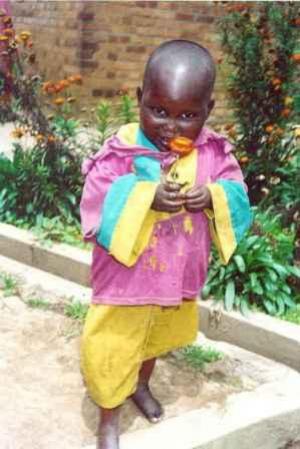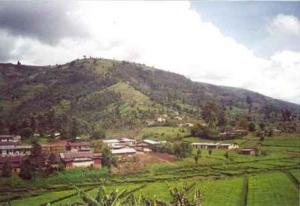 On 27th January 1997, three years after the terrible genocide five Holy Family Sisters arrived in
On 27th January 1997, three years after the terrible genocide five Holy Family Sisters arrived in 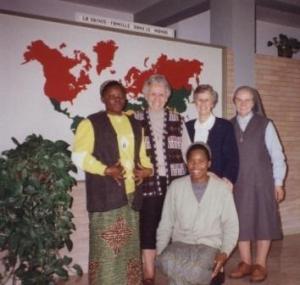 The new community was one of different cultures, experience and ages. Agnes was from
The new community was one of different cultures, experience and ages. Agnes was from
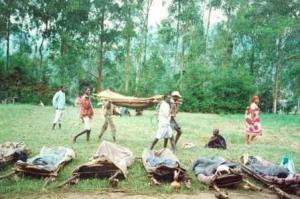 Their immediate response was in Health Care: the Sisters began work in the Diocesan Health Centre. A year and two years later they were hit with epidemics of malaria and other infectious diseases. The hills became infirmaries. Next came the Nutrition Centre, taking care of hundreds of children and mothers, undernourished by the destruction of their harvests, their displacement and several months in refugee camps. With the help of many people of good will and various organisations, they did their best to respond creatively to the urgent needs that presented themselves: tuberculosis and AIDS, mental illness, orphans and physically handicapped people.
Their immediate response was in Health Care: the Sisters began work in the Diocesan Health Centre. A year and two years later they were hit with epidemics of malaria and other infectious diseases. The hills became infirmaries. Next came the Nutrition Centre, taking care of hundreds of children and mothers, undernourished by the destruction of their harvests, their displacement and several months in refugee camps. With the help of many people of good will and various organisations, they did their best to respond creatively to the urgent needs that presented themselves: tuberculosis and AIDS, mental illness, orphans and physically handicapped people.
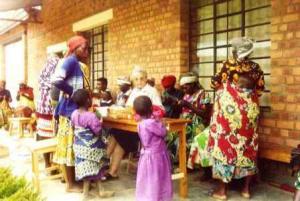 The Centre, Nazareth House of Peace is inspired by our Corporate Commitment: “As consecrated women, becoming more conscious of our own dignity, we wish to affirm and promote the dignity of woman so that together we take our place in the Church and society and contribute to the transformation of the world in our own specific way.”
The Centre, Nazareth House of Peace is inspired by our Corporate Commitment: “As consecrated women, becoming more conscious of our own dignity, we wish to affirm and promote the dignity of woman so that together we take our place in the Church and society and contribute to the transformation of the world in our own specific way.”
It began with literacy classes and education for life, but quickly expanded to include cookery,
PASTORAL WORK AND EDUCATION All during these years the community has been trying to attend, as far as its possibilities allow, to the calls from the secondary school by giving religion classes when they can. They also take part in the training of catechists. The Sisters are very involved in the parish. They support the priest and committed laity. The people express their faith by flocking to Mass every Sunday. They come from afar and tom-toms, choral singing, dances and brightly coloured clothes give a festive air, an air of meeting and sharing. This sharing is completed in their visits to the villages where they meet with the people along the way. They go into their houses and share their own food and drink millet beer from the same calabash as a prolongation of the thanksgiving the Eucharist.
EVENTS THAT HAVE MARKED THE COMMUNITY: The Sisters see as a grace the foundation in 1998 of the Ugandan community, just 50 kms away from Rushaki. The two communities cultivate Family bonds and the difference of language is never an obstacle. Some Rwandan girls present themselves wishing to commit to Holy Family Religious Life. The Sisters now face new challenges and must modify their work to meet these new ministries. The celebration of these ten years is an occasion to stand back, evaluate, and dream of a future full of new dynamism without being afraid of leaving some activities and bravely discerning new priorities. It is one way of continuing to choose life in fidelity to our Holy Family 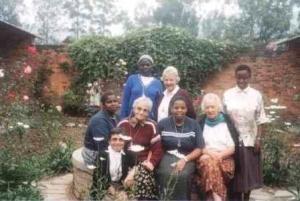 During the course of the years the community has changed and been reinforces. Some members have returned definitively to their own country and others have left for some time for studies. The current community consists of Joaquina, Maria Oteiza, Maria Jesus, and
During the course of the years the community has changed and been reinforces. Some members have returned definitively to their own country and others have left for some time for studies. The current community consists of Joaquina, Maria Oteiza, Maria Jesus, and 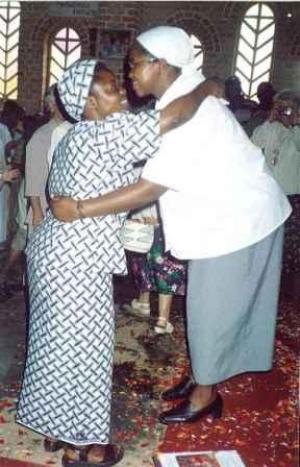 In December 2005, Scholastica the first Rwandan sister, made her final profession. At the moment there is a temporary professed and two pre-novices as well as a young person discerning her vocation to contemplative life.
In December 2005, Scholastica the first Rwandan sister, made her final profession. At the moment there is a temporary professed and two pre-novices as well as a young person discerning her vocation to contemplative life.


